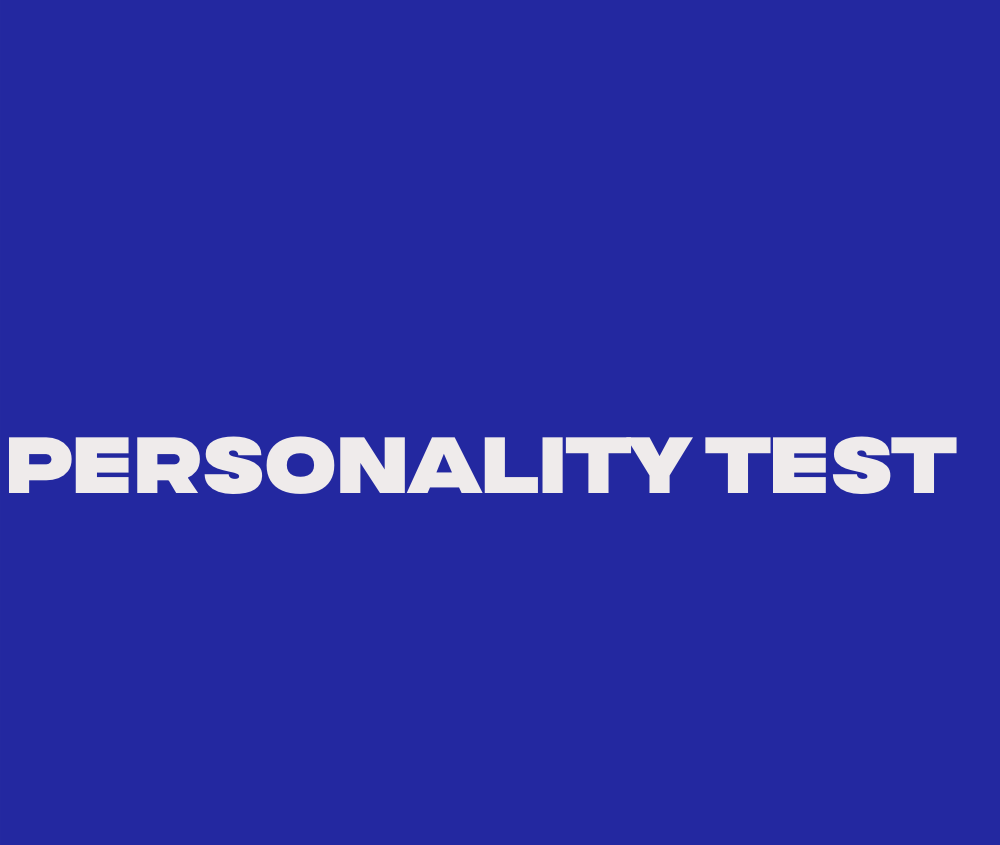Personality Exploration
ABCD Personality Test: Discover Your Type!
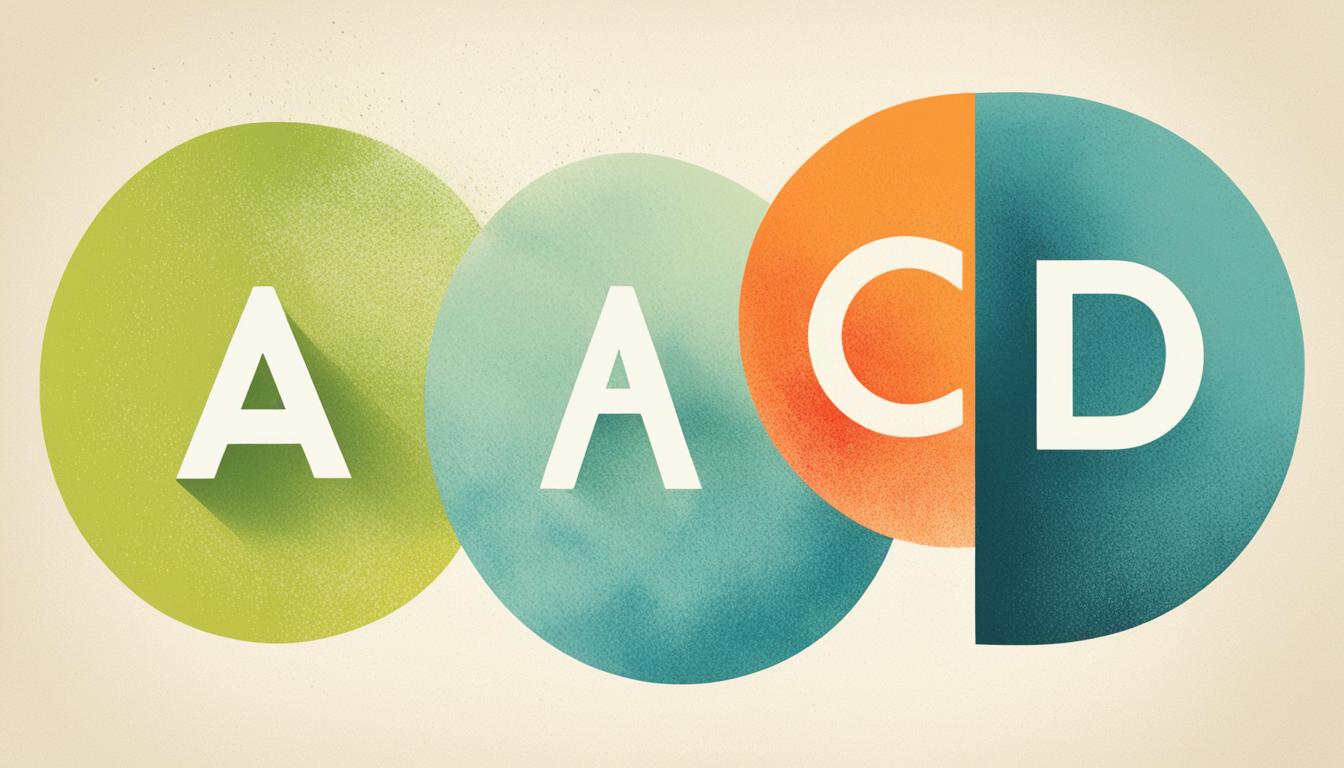
Did you know that taking a personality test can provide invaluable insights into your strengths, weaknesses, and motivations?
These tests have gained immense popularity in recent years as individuals strive to gain a better understanding of themselves and their unique traits. One such test that has gained significant attention is the ABCD Personality Test.
By taking the ABCD Personality Test, you can uncover which of the four distinct types – Type A, Type B, Type C, or Type D – you identify with. Each type comes with its own set of characteristics and motivations that shape your behavior and choices.
Are you ready to delve into the fascinating world of personality assessment and discover your type? Let’s explore the ABCD Personality Test together!
Key Takeaways:
- The ABCD Personality Test provides valuable insights into your personality traits and characteristics.
- There are four distinct types in the ABCD Personality Test: Type A, Type B, Type C, and Type D.
- Understanding your personality type can help you make informed decisions and navigate various aspects of your life.
- The ABCD Personality Test can be a valuable tool for self-discovery and personal growth.
Understanding Type A Personality
People with Type A personalities possess a unique set of traits that shape their behavior and outlook on life. These individuals are characterized by their competitive nature, goal-oriented mindset, ambition, and organizational skills. They thrive in leadership positions and are driven by success, monetary rewards, and challenging endeavors.
Being highly motivated and focused, Type A individuals possess several strengths that contribute to their success:
- Competitiveness: Type A personalities have a strong desire to outperform others and achieve the best results.
- Goal-oriented mindset: They set clear objectives and work relentlessly to accomplish them.
- Ambition: Type A individuals have a burning desire to climb the ladder of success and achieve recognition.
- Organizational skills: They excel at planning, managing tasks, and staying on top of their responsibilities.
However, Type A personality traits also come with certain weaknesses. These weaknesses can be addressed with self-awareness and focused efforts:
- Resistance to others’ opinions: Type A individuals may struggle to consider alternative perspectives and be more assertive in expressing their own views.
- Controlling nature: They have a tendency to take charge and want things done their way, which can lead to conflicts with others.
- Quick to anger: Due to their drive and intensity, Type A individuals can be prone to feelings of frustration or irritation.
Understanding the strengths and weaknesses of Type A personalities is crucial for personal growth and successful career choices. The ideal careers for Type A individuals capitalize on their strengths and provide an environment that nurtures their ambitious nature:
Type A Strengths Ideal Careers Competitiveness Business, sales, entrepreneurship Goal-oriented mindset Project management, consulting, law Ambition Executive leadership, finance, politics Organizational skills Operations management, event planning, logistics
Understanding Type B Personality
Type B individuals are known for their relaxed, easy-going nature and their ability to bring a sense of fun and comfort to those around them. They possess unique strengths and weaknesses that shape their approach to work and everyday life.
Type B Strengths
- Creativity: Type B individuals are often creative thinkers, able to generate innovative ideas and solutions. They possess a unique perspective that can bring fresh insights to any situation.
- Adaptability: Their laid-back nature allows Type B personalities to adapt well to changing circumstances. They can handle unexpected challenges with ease and flexibility.
- Interpersonal Skills: Type B individuals are naturally charming and likable. They have an ability to make others feel comfortable and valued, which helps them build strong relationships.
Type B Weaknesses
- Time Management: Due to their relaxed nature, Type B individuals may struggle with meeting deadlines and staying organized. They may find it challenging to prioritize tasks and stay focused.
- Motivation: Type B personalities may lack the competitive drive and ambition associated with Type A individuals. They may require external motivation to stay engaged and driven in their endeavors.
- Detail-Oriented Tasks: Their preference for a big picture approach may make Type B individuals less suited for roles that require meticulous attention to detail.
Despite these weaknesses, Type B personalities thrive in roles that value adaptability, creativity, and interpersonal skills. Ideal career paths for Type B individuals include public speaking, customer service, entertainment, and hospitality.
So, if you find yourself leaning towards a more relaxed and easy-going approach to life, embrace your Type B personality and leverage your strengths to excel in your chosen endeavors.
Life is a journey, and each personality type brings its unique strengths and weaknesses to the table. Embrace who you are and make the most out of your own personality traits.

| Type B Strengths | Type B Weaknesses |
|---|---|
| Creativity | Time Management |
| Adaptability | Motivation |
| Interpersonal Skills | Detail-Oriented Tasks |
Understanding Type C Personality
Type C individuals possess a unique set of characteristics that set them apart from other personality types. They are detail-oriented, focused perfectionists who thrive in environments that require analytical thinking and precision. These individuals find great satisfaction in their work and are motivated by the pursuit of excellence.
One of the key strengths of Type C personalities is their exceptional attention to detail. They have a natural ability to spot even the smallest errors and are meticulous in their approach to tasks. This attention to detail enables them to produce high-quality work that is often praised for its accuracy and reliability.
Additionally, Type C individuals excel at working independently. They are self-motivated and can maintain high levels of productivity without the need for constant supervision or external validation. Their focused and disciplined nature allows them to concentrate deeply on their work and consistently deliver outstanding results.
However, Type C personalities also have their weaknesses. They tend to struggle in social situations, as they may find it difficult to express their emotions or understand the feelings of others. This can sometimes lead to misunderstandings or a lack of connection with colleagues or friends.
Furthermore, their perfectionistic tendencies may cause them to become overly critical of themselves and others. Type C individuals often set exceptionally high standards and may become frustrated or stressed when these expectations are not met. This internal pressure can sometimes hinder collaboration and prevent them from delegating tasks effectively.
Despite these challenges, Type C individuals are highly valued in certain career fields. Their analytical thinking, attention to detail, and ability to produce high-quality work make them excellent candidates for careers in engineering, research, data analysis, inventing, and writing.
When it comes to understanding Type C personality, it’s important to recognize their strengths and weaknesses. By leveraging their attention to detail and independent working style, Type C individuals can make significant contributions in their chosen fields. However, they should also be mindful of their social skills and strive to develop effective communication strategies to enhance their interpersonal relationships.
Type C Strengths Type C Weaknesses Exceptional attention to detail Difficulty in social situations Ability to work independently Perfectionistic tendencies Analytical thinking Overly critical of self and others
Overall, Type C individuals are an integral part of diverse industries and contribute their unique strengths to the workforce. By understanding and appreciating their personality traits, we can create environments that foster their success and encourage their continued growth.
Understanding Type D Personality
Type D individuals possess unique qualities that make them an essential part of any team or social circle. They are known for their kind, caring, and patient nature, which makes them reliable and supportive friends and colleagues. Let’s delve deeper into the strengths and weaknesses of Type D personalities.
Strengths of Type D Personality
One of the key strengths of individuals with Type D personality is their ability to create and maintain meaningful relationships. People with Type D personalities are highly empathetic and display great emotional intelligence, allowing them to connect with others on a deep level. Their caring and nurturing nature make them excellent listeners and support systems for those around them.
Additionally, Type D individuals are remarkably organized and value routines. They thrive in structured environments and are unwavering in their commitment to completing tasks efficiently and effectively. This attention to detail and reliability make them ideal team players, especially in administrative roles or jobs that require strong organizational skills.
Weaknesses of Type D Personality
While Type D individuals possess many admirable qualities, they may face certain challenges. Quick thinking may not be their strongest suit, as they tend to take their time to process information thoroughly. This inclination toward a more deliberate thought process can sometimes hinder their ability to make snap decisions or adapt to unexpected changes.
Moreover, individuals with Type D personality are naturally averse to big changes. They find comfort in familiarity and stability, which can make it challenging for them to embrace new situations or environments. However, once they have had the time to adjust, they can excel in their roles.
It’s essential for Type D personalities to be mindful of their tendency to become overwhelmed by stress and avoid bottling up their emotions. Open communication and seeking support when needed can help them navigate difficult situations more effectively.
“Type D individuals are the pillars of support and stability, valuing connections and routines in their personal and professional lives.” – Anonymous
Here is a table summarizing the strengths and weaknesses of Type D personalities:
Strengths Weaknesses Highly empathetic and caring Slow decision-making process Great emotional intelligence Resistance to big changes Excellent listeners and support systems Tendency to be overwhelmed by stress Organized and reliable Difficulty with quick thinking
By understanding the strengths and weaknesses of Type D personalities, we can appreciate the positive contributions they bring to various environments. Their caring nature, organizational skills, and steadfastness make them valuable assets in careers such as therapy, administration, medicine, and human resources.

Take the ABCD Personality Test Online
Discover your unique personality type by taking the ABCD Personality Test online. This free personality test provides valuable insights into your strengths, weaknesses, motivations, and ideal career paths based on your personality type. It’s a valuable tool for self-discovery and gaining a better understanding of yourself.
Through a series of carefully designed questions, the ABCD Personality Test evaluates your preferences, behaviors, and attitudes to determine which of the four distinct types you align with: Type A, Type B, Type C, or Type D. Once you receive your results, you can explore the characteristics and traits associated with your personality type.
Are you a competitive and ambitious Type A individual, or a relaxed and creative Type B individual? Perhaps you resonate with the detail-oriented and focused Type C, or the caring and organized Type D. The ABCD Personality Test will help you uncover these aspects of your personality.
Understanding your personality type can have a profound impact on your life, influencing your relationships, career choices, and personal growth. By recognizing your strengths and weaknesses, you can leverage your natural abilities and work on areas that need improvement.
“The first step of self-improvement is self-understanding.”
Benefits of Taking the ABCD Personality Test Online
- Gain insights into your unique personality traits
- Discover your strengths and weaknesses
- Understand your motivations and drives
- Identify ideal career paths aligned with your personality type
- Enhance self-awareness and personal growth
Example of ABCD Personality Test Results
| Personality Type | Strengths | Weaknesses | Ideal Careers |
|---|---|---|---|
| Type A | Competitive, goal-oriented, ambitious | Can be controlling, easily angered | Leadership positions, sales, business, politics |
| Type B | Relaxed, easy-going, creative | Struggles with deadlines, staying organized | Public speaking, customer service, entertainment, hospitality |
| Type C | Detail-oriented, focused, analytical | Struggles with social situations, understanding emotions | Engineering, research, data analysis, inventing, writing |
| Type D | Caring, patient, organized | Trouble with quick thinking, big changes | Therapy, administration, medicine, human resources |
Take control of your self-discovery journey by taking the ABCD Personality Test online. Understand your unique personality type and leverage its insights to make informed decisions and live a more fulfilling life.
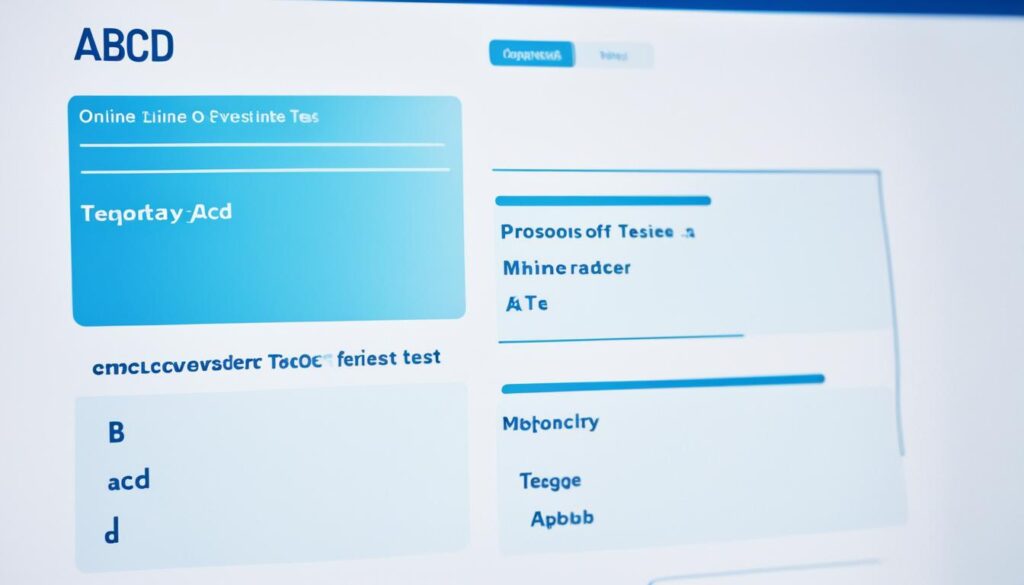
Applying the ABCD Personality Test to Careers
The ABCD Personality Test is not only useful for gaining insights into your personality type but also for career assessment. By understanding your unique personality traits and characteristics, you can identify the ideal career paths that align with your strengths and motivations. Whether you excel as a Type A leader, a Type B creative, a Type C analytical thinker, or a Type D caregiver, the ABCD Personality Test can help you discover the perfect job that suits your personality.
Identifying Your Ideal Career
When it comes to finding a fulfilling career, it’s essential to consider your natural inclinations and preferences. The ABCD Personality Test can guide you in identifying the industries and roles that are most suitable for your personality type.
“Your career is where your passion meets your purpose.”
- Type A Personality: If you possess strong leadership skills, are ambitious, and thrive in competitive settings, you may excel in positions that require taking charge and driving teams towards success. Consider careers in sales, business management, entrepreneurship, or politics.
- Type B Personality: If you’re laid-back, creative, and enjoy a more relaxed approach to work, consider roles that allow for flexibility and creativity. Careers in public speaking, customer service, entertainment, or hospitality may be a good fit.
- Type C Personality: If you’re detail-oriented, analytical, and have a natural inclination towards precision, consider careers that require problem-solving and critical thinking skills. Fields such as engineering, research, data analysis, invention, and writing may be well-suited for you.
- Type D Personality: If you’re compassionate, caring, and thrive in nurturing roles, consider careers that involve helping others. Roles in therapy, administration, medicine, or human resources may provide a fulfilling career path.
Achieving Success in Your Chosen Career
Once you’ve identified your ideal career path based on your personality type, it’s important to focus on developing the necessary skills and refining your strengths to excel in your chosen field.
“Success is not the key to happiness. Happiness is the key to success. If you love what you do, you will be successful.”
Remember to leverage your unique traits to your advantage. If you’re a Type A leader, embrace your natural drive and utilize your organizational skills to lead teams effectively. If you’re a Type B creative, let your imaginative thinking shine and find innovative solutions to problems. Similarly, if you’re a Type C analytical thinker, capitalize on your attention to detail and deliver precise results. And if you’re a Type D caregiver, utilize your empathy and compassion to create meaningful connections with others.
Continuously work on developing both your personal and professional skills to further enhance your success in your chosen career. Seek learning opportunities, networking events, and mentorship programs that align with your industry and interests.
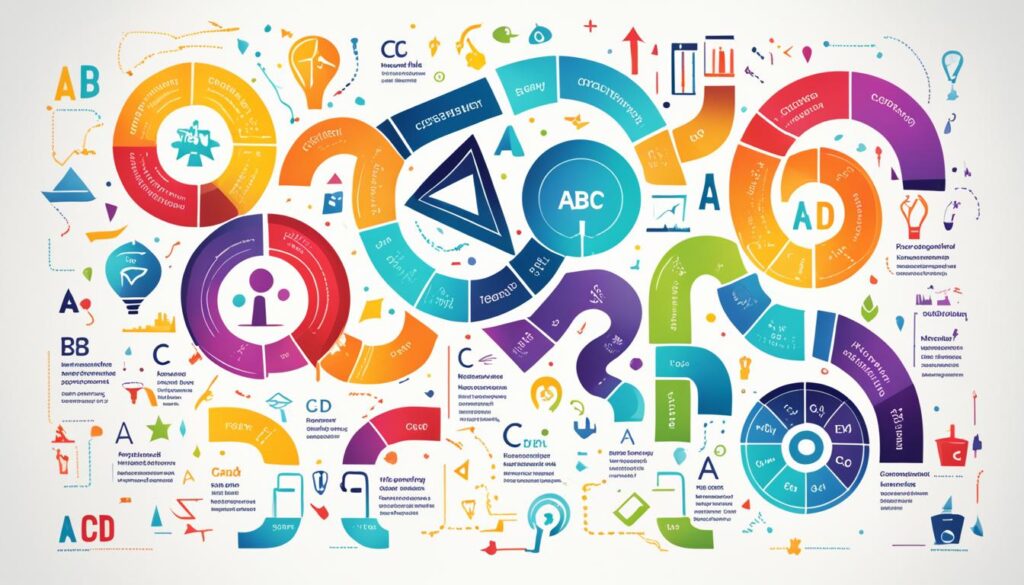
Understanding your personality type through the ABCD Personality Test can empower you to make informed decisions about your career and set you on the path to professional satisfaction and fulfillment.
The Impact of Personality on Self-Discovery
Self-discovery and self-awareness play significant roles in personal growth. Understanding our unique personality traits and characteristics through tests like the ABCD Personality Test can provide valuable insights into how we interact with the world around us and identify areas for improvement.
By embracing our strengths and working on our weaknesses, we can enhance both our personal and professional lives. Recognizing our personality traits enables us to make conscious decisions that are better aligned with our true selves.
“To thine own self be true.” – William Shakespeare
By taking the time to explore our personality through self-discovery, we can gain a deeper understanding of our behaviors, motivations, and preferences. This knowledge can be a powerful tool in guiding our life choices and fostering personal development. Self-awareness allows us to recognize patterns in our thoughts, emotions, and relationships, enabling us to make positive changes and achieve a greater sense of fulfillment.
The Role of Personality Traits Test
Personality traits tests, like the ABCD Personality Test, provide a structured framework for self-discovery. These tests help us identify core aspects of our personalities, such as our tendencies, strengths, and weaknesses. By highlighting these traits, personality tests empower us to make informed decisions and adapt our behaviors to maximize our potential.
- Self-discovery: Personality tests offer a starting point for self-discovery by providing a comprehensive overview of our traits. They encourage introspection and self-reflection, allowing us to dive deeper into our own psyche.
- Insights into interaction: Understanding our personality traits helps us better understand how we interact with others. Whether it’s in personal relationships or professional collaborations, this awareness can enhance our communication skills and foster better connections.
- Spotlight on strengths: Personality tests highlight our strengths, enabling us to leverage them for personal and professional growth. By capitalizing on our innate abilities, we can excel and find greater fulfillment in our endeavors.
- Identifying weaknesses: Personality tests also shed light on our weaknesses or areas for improvement. Recognizing these areas empowers us to take action and develop new skills, leading to personal growth and self-improvement.
Embracing the insights provided by personality traits tests allows us to take a proactive role in our own development. By using this knowledge as a guide, we can navigate life’s challenges and opportunities with a greater sense of self-awareness and confidence.
The Power of Self-Discovery
Self-discovery is not a one-time event but an ongoing journey. It involves continuous learning, exploration, and growth. By embracing self-discovery, we can unlock our full potential and lead more fulfilling lives.

| Benefits of Self-Discovery | |
|---|---|
| 1. | Improved self-esteem and self-confidence. |
| 2. | Better decision-making abilities. |
| 3. | Enhanced personal relationships. |
| 4. | Increased resilience and adaptability. |
| 5. | Alignment with personal values and goals. |
| 6. | Greater clarity about life purpose and meaning. |
Self-discovery is a journey of authenticity, personal growth, and fulfillment. By understanding our personality traits and leveraging them to our advantage, we can live a life true to ourselves and make meaningful contributions to the world around us.
The History of the ABCD Personality Types
Let’s delve into the fascinating history of the ABCD personality types and how they came to be. This classification system was initially introduced by renowned cardiologists, Meyer Friedman and Ray Rosenman, during the 1950s. These two brilliant minds embarked on a quest to better understand the relationship between personality types and heart disease.
Initially, their research focused on Type A and Type B personalities. Type A individuals were characterized by their ambitious, competitive nature, high levels of stress, and a sense of urgency. In contrast, Type B individuals were more laid-back, relaxed, and less prone to stress. The findings revealed that Type A individuals were more susceptible to heart disease, while Type B individuals had a lower risk.
As the research progressed, Friedman and Rosenman expanded their study to include two additional personality types: Type C and Type D. Type C individuals were characterized by their analytical nature, attention to detail, and a tendency to suppress emotions. On the other hand, Type D individuals exhibited traits such as introversion, worry, and a tendency to experience negative emotions.
“The ABCD personality types were born out of our research into the intricate connection between personality and heart disease. We discovered distinct patterns and behaviors that have far-reaching implications for individuals’ well-being and overall health.” – Meyer Friedman
The ABCD personality types categorize individuals based on their behavior, attitudes, and responses to stress. This categorization provides valuable insights into how different personality types navigate the challenges of life and cope with stressors.
By understanding your own personality type, you can gain self-awareness and make informed decisions that align with your strengths and weaknesses. Embracing your unique personality traits can lead to personal and professional growth, ultimately enhancing your overall well-being.
Now that we’ve explored the history of the ABCD personality types, let’s dive deeper into the significance of the ABCD Personality Test and how it can help you gain a better understanding of yourself.

| Personality Type | Description |
|---|---|
| Type A | Ambitious, goal-oriented, and prone to stress |
| Type B | Relaxed, easy-going, and adaptable |
| Type C | Analytical, detail-oriented, and emotionally reserved |
| Type D | Introverted, worrisome, and prone to negative emotions |
The Significance of the ABCD Personality Test
The ABCD Personality Test holds great importance when it comes to personality profiling, evaluation, and understanding various personality traits. This test provides individuals with a comprehensive way to evaluate and profile themselves based on their unique personality characteristics. By recognizing and embracing our individual personality types, we can gain a deeper understanding of our strengths, weaknesses, motivations, and ideal career paths. Armed with this knowledge, we are better equipped to make informed decisions and navigate life more effectively.
Recognizing Personal Strengths and Weaknesses
One of the key benefits of the ABCD Personality Test is the ability to identify and analyze our individual strengths and weaknesses. Through a systematic evaluation of our personality traits, we can gain valuable insights into areas where we excel and areas where we may need improvement. This self-awareness enables us to harness our strengths and address any weaknesses, fostering personal growth and development.
Understanding Motivations
Personality evaluation through the ABCD Personality Test facilitates a greater understanding of our motivations and what drives us. By delving into the depths of our personality traits, we gain insights into what motivates us to excel and achieve our goals. This self-awareness allows us to align our aspirations and actions with our core motivations, bringing us closer to realizing our full potential.
Navigating Ideal Career Paths
Another significant aspect of the ABCD Personality Test is its ability to guide individuals toward their ideal career paths. By carefully analyzing our personality traits and characteristics, we can identify professions that align with our strengths, preferences, and motivations. This knowledge not only paves the way for career satisfaction but also enhances productivity and success in the chosen field.
“The ABCD Personality Test offers individuals a roadmap to self-discovery, enabling them to identify their strengths, weaknesses, motivations, and ideal career paths.”
The significance of the ABCD Personality Test lies in its ability to facilitate personal growth and development through personality profiling, evaluation, and recognition of our unique traits. By leveraging this knowledge, we can make informed decisions, enhance our self-awareness, and strive towards a fulfilling and purpose-driven life.

Conclusion
The ABCD Personality Test is a powerful tool that provides valuable insights into your unique personality type. By taking this personality quiz, you can gain a deeper understanding of yourself, your strengths, and your weaknesses. Armed with this knowledge, you can embark on a journey of self-discovery and personal growth.
Whether you identify as a Type A, Type B, Type C, or Type D, each personality type has its own set of characteristics and tendencies. Embracing your personality analysis allows you to leverage your strengths to their fullest potential and work on areas that may need improvement.
By understanding your personality type, you can also make more informed decisions about your career and personal life. Identifying the ideal career paths and environments for your personality type can lead to greater job satisfaction and overall fulfillment.
So why wait? Take the ABCD Personality Test today and unlock a wealth of insights into your true self. Start your journey of self-discovery and embrace the power of personality analysis. Discover your type and unleash your potential!
The ABCD Personality Test categorizes individuals into four distinct types: Type A, Type B, Type C, and Type D. It helps you discover which type you identify with and gain insights into your personality traits and characteristics.
Type A individuals are competitive, goal-oriented, ambitious, and organized. They excel in leadership roles and are motivated by success, money, and challenges. However, they may struggle with considering others’ opinions and can be controlling or easily angered.
Type B individuals are relaxed, easy-going, and fun-loving. They are creative thinkers who make others feel comfortable. While they may struggle with deadlines and staying organized, they excel in roles that require adaptability and a laid-back approach.
Type C individuals are detail-oriented, focused perfectionists who thrive when working alone. They excel in careers that require analytical thinking and precision. However, they may struggle with social situations and understanding the emotions of others. Type D individuals are kind, caring, patient, and organized. They are reliable friends who prefer a simple life and value routines. While they may have trouble with quick thinking and big changes, they are content with the familiar.
You can take the ABCD Personality Test online to discover your type. This test provides insights into your strengths, weaknesses, motivations, and ideal career paths based on your personality type.
Yes, understanding your personality type through the ABCD Personality Test can help you identify career paths that align with your strengths and motivations. It provides valuable insights into the type of work environment and roles that suit your personality traits and characteristics.
The ABCD Personality Test helps individuals gain a better understanding of themselves by providing insights into their personality traits and characteristics. It aids in identifying areas of improvement, embracing strengths, and working on weaknesses, leading to personal and professional growth.
The ABCD Personality Types were introduced by cardiologists Meyer Friedman and Ray Rosenman in the 1950s, initially with Type A and Type B personalities. It expanded to include Type C and Type D, categorizing individuals based on their behavior, attitudes, and responses to stress. The ABCD Personality Test provides a way to profile and evaluate individuals based on their personality traits. It helps in understanding individual strengths, weaknesses, motivations, and ideal career paths. By recognizing and embracing your unique personality type, you can make informed decisions and navigate life more effectively.
By taking the ABCD Personality Test, you can gain valuable insights into your personality type and better understand yourself. Embracing your strengths and working on your weaknesses can lead to personal and professional growth, enhancing various aspects of your life.
FAQ
What is the ABCD Personality Test?
What are the characteristics of Type A personality?
What are the characteristics of Type B personality?
What are the characteristics of Type C personality?
What are the characteristics of Type D personality?
How can I take the ABCD Personality Test online?
Can the ABCD Personality Test help with my career assessment?
How does the ABCD Personality Test impact self-discovery?
Who introduced the ABCD Personality Types?
What is the significance of the ABCD Personality Test?
What can I learn from the ABCD Personality Test?
Eugene brings a fresh, dynamic voice to our platform as one of our talented Writers. Specializing in research-driven content, he explores the latest findings in psychology and personal growth, translating them into actionable insights for our readers. Eugene’s work is fueled by a curiosity about what makes us tick and a desire to help others unlock their potential.
The Big Five (OCEAN)
What Is the Tax Assessment for 1320 Vina Ave Ocean Nj?
Tantalizingly close to uncovering the tax assessment for 1320 Vina Ave in Ocean, NJ, embark on a journey to unravel the intricate factors shaping property evaluations.

As we approach the virtual entrance of 1320 Vina Ave in Ocean, NJ, the question hangs in the air: what is the tax assessment for this property?
While the specifics may not be immediately apparent, the intricate web of factors that influence tax assessments holds the key to unraveling this mystery.
Join us as we explore the nuances of property tax assessments, shedding light on the importance of accurate evaluations and the potential implications for homeowners.
Key Takeaways
- The tax assessment for 1320 Vina Ave, Ocean, NJ is crucial for determining property tax obligations.
- Property characteristics, location, and market conditions influence the tax assessment.
- Accuracy in assessment ensures fair taxation and equitable distribution of tax burden.
- Homeowners can appeal the assessment if they believe it is inaccurate, potentially reducing property taxes.
Understanding Property Tax Assessments
When assessing property taxes, we consider various factors that impact the value of a property in order to determine the tax owed to the local government. In the case of 1320 Vina Ave in Ocean, NJ, the tax assessment hinges on the property's value as determined by the local tax assessor. This valuation plays a crucial role in calculating how much the property owner will need to pay in taxes to the local government.
Factors such as the size of the property, its location, any improvements made, and comparable sales in the area are all taken into account during the assessment process. By analyzing these elements, the tax assessor aims to distribute the tax burden among property owners fairly and accurately.
It's vital to comprehend that changes in property tax assessments can significantly impact the annual tax obligations of a property owner, making it imperative to stay informed about the assessment process and one's property rights reserved.
Factors Influencing Tax Assessment

Factors influencing tax assessment include the property's characteristics, market conditions, and any recent changes in property value. The size, location, amenities, and recent sales of comparable properties all play a crucial role in determining the tax assessment value. Property improvements, renovations, and fluctuations in the real estate market can also impact the assessment. Additionally, the tax assessment is essential for calculating property taxes owed to the local government. Property owners should be aware that they have the right to appeal the assessment if they believe it is inaccurate. Below is a table summarizing the key factors that influence tax assessment:
| Factors Influencing Tax Assessment |
|---|
| Property Characteristics |
| Market Conditions |
| Recent Changes in Property Value |
Importance of Accurate Assessments
Accurate assessments play a pivotal role in ensuring fair and equitable property tax obligations for homeowners in Ocean, NJ.
- Fair Taxation: Accurate assessments help distribute the tax burden fairly among property owners based on the actual value of their properties.
- Equity: Ensuring accuracy in assessments prevents disparities where some homeowners may be unfairly taxed more or less than others.
- Budget Planning: Property tax revenues are a significant source of income for local governments, and accurate assessments are essential for proper budget planning and allocation of resources.
- Community Development: Properly assessed property taxes contribute to the funding of essential services like schools, infrastructure, and public safety, fostering community development.
Appeals Process for Tax Assessments

Initiating an appeal for a tax assessment involves submitting a formal written request to the local tax assessor's office. Property owners who believe their tax assessment is inaccurate or unfair can follow this process.
The appeal typically requires the submission of evidence supporting the property owner's claim, such as recent comparable property sales or a professional appraisal. This evidence is crucial in demonstrating why the current assessment may not align with the property's actual market value.
The outcome of a tax assessment appeal can lead to a revision of the property's assessed value, potentially resulting in lower property taxes for the owner. It's essential for property owners to carefully review their assessment and consider appealing if they've valid reasons to believe it's incorrect.
Impact of Tax Assessments on Homeowners
Given the potential financial implications of tax assessments on homeowners, understanding how these assessments impact property taxes and overall housing costs is crucial.
- Tax assessments directly influence property taxes, with higher assessments often resulting in increased tax burdens for homeowners.
- The assessment for a property like 1320 Vina Ave can play a significant role in determining its resale value, as it reflects the local government's valuation of the property.
- Homeowners have the option to appeal tax assessments if they believe the assessed value doesn't align with the actual market value of their property.
- Being knowledgeable about tax assessments is essential for homeowners to effectively manage their financial responsibilities and plan their budgets accordingly.
Considering these factors, homeowners must stay informed about tax assessments to make informed decisions regarding their property investments and financial well-being.
Frequently Asked Questions
How Do Property Tax Assessments Differ for Residential and Commercial Properties?
When comparing property tax assessments for residential and commercial properties, it's essential to note the differing evaluation methods. Residential properties are typically assessed based on their market value and comparable sales in the area, while commercial properties may also consider the income generated or cost to replace the property.
This variation reflects the distinct purposes and characteristics of these property types, impacting how tax assessments are calculated and adjusted.
Are There Any Exemptions or Deductions Available for Property Tax Assessments in Ocean, Nj?
In Ocean, NJ, there are exemptions and deductions available for property tax assessments. These can provide relief for certain homeowners, such as seniors or disabled individuals, easing the financial burden of property ownership.
Understanding these options is crucial for maximizing savings and ensuring fair taxation. By exploring these exemptions and deductions, homeowners can navigate the complexities of property tax assessments with confidence and peace of mind.
Can Property Owners Request a Reassessment of Their Tax Assessment Outside of the Formal Appeals Process?
Yes, property owners can request a reassessment of their tax assessment outside of the formal appeals process. This option allows for a proactive approach to potentially lower property taxes.
How Do Tax Assessments Affect the Resale Value of a Property in Ocean, Nj?
When considering how tax assessments impact property resale value in Ocean, NJ, it's crucial to recognize the direct correlation between assessment amounts and potential buyer perception.
Higher tax assessments can deter buyers seeking affordability, while lower assessments may attract budget-conscious buyers.
These assessments serve as a key factor in determining a property's overall market appeal and can significantly influence its resale value.
Are There Any Community Initiatives or Programs in Ocean, NJ Aimed at Helping Homeowners Understand and Manage Their Tax Assessments?
There are community initiatives and programs in Ocean, NJ aimed at helping homeowners understand and manage their tax assessments. These programs often provide workshops, resources, and guidance to navigate the complexities of tax assessments.
By participating in these initiatives, homeowners can gain valuable insights into how tax assessments impact their property values and learn strategies to potentially lower their tax burden.
How Can I Determine the Tax Assessment for a Property in Ocean, NJ?
To determine the tax assessment for a property in Ocean, NJ, follow these effective ocean assessment steps. First, gather property details from the local assessor’s office. Next, review recent sales of similar properties in the area. Then, compare the assessed value to the market value. Finally, consider appealing the assessment if needed.
Conclusion
In conclusion, accurate property tax assessments are crucial for homeowners as they directly impact the amount of taxes they pay.
One interesting statistic to note is that the tax assessment for 1320 Vina Ave, Ocean, NJ 07712 isn't provided, but the property's Zestimate has increased by $19,472 (2.7%) in the past 30 days.
This highlights the fluctuating nature of property values and the importance of staying informed about tax assessments.
Eugene brings a fresh, dynamic voice to our platform as one of our talented Writers. Specializing in research-driven content, he explores the latest findings in psychology and personal growth, translating them into actionable insights for our readers. Eugene’s work is fueled by a curiosity about what makes us tick and a desire to help others unlock their potential.
The Big Five (OCEAN)
Ocean Assessment Framework: A Step-by-Step Guide
Keen to unlock the secrets of sustainable ocean management? Dive into the Ocean Assessment Framework for a transformative journey towards marine conservation.
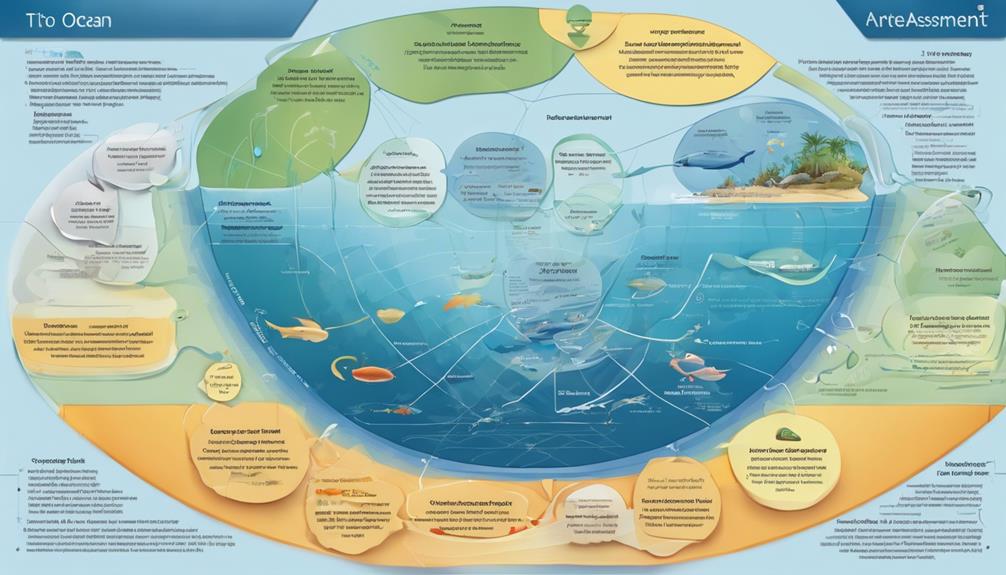
As we explore the extensive waters of our oceans, it is important to recognize that only a mere 7% of the world’s oceans are currently protected. With such a small percentage safeguarded, our comprehension and care for marine environments become essential.
The Ocean Assessment Framework offers a structured path towards sustainable ecosystem management, but what exactly makes this guide a pivotal tool in the realm of marine conservation?
Let's explore the intricate steps laid out within this framework and uncover how it can shape the future of our oceans.
Key Takeaways
- Assess biodiversity, habitat quality, and water conditions for marine ecosystem health
- Utilize data analysis tools to monitor ocean parameters and trends effectively
- Implement conservation measures like Marine Protected Areas and sustainable practices
- Promote respectful behavior towards oceans and support initiatives for marine ecosystem conservation
Importance of Ocean Assessment Framework
The Ocean Assessment Framework stands as an indispensable tool in our efforts to assess the health and sustainability of marine ecosystems. This structured approach allows us to comprehensively understand the impacts of human activities on oceans, paving the way for informed decision-making.
By providing a systematic method for monitoring marine resources, the framework enables us to implement conservation measures effectively. Through assessing oceans using this framework, we can pinpoint key areas requiring intervention and management, thus directing resources where they're most needed.
This process is vital in promoting sustainable practices and safeguarding marine biodiversity, ensuring the long-term health of our oceans. In essence, the Ocean Assessment Framework serves as a beacon guiding our conservation efforts, offering a pathway towards a future where marine ecosystems thrive in harmony with human activities.
Key Indicators for Marine Ecosystems
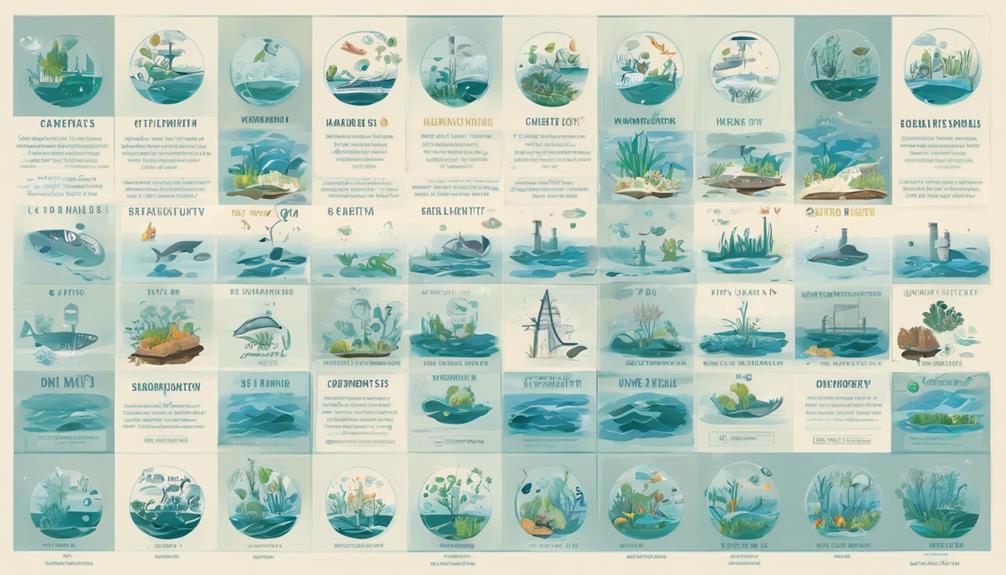
Assessing the health of marine ecosystems involves closely monitoring key indicators such as biodiversity levels, habitat quality, water quality, and population trends of key species. These indicators provide valuable insights into the overall well-being of marine environments. For instance, changes in coral reef health, seagrass coverage, and mangrove distribution are crucial factors that reflect the ecological balance within these ecosystems. Additionally, tracking nutrient levels, presence of pollutants, and ocean acidification levels are essential for understanding the impact of human activities on marine environments.
Population dynamics of fish stocks, migratory patterns of marine species, and changes in sea surface temperature serve as critical indicators for assessing the resilience of marine ecosystems to environmental stressors. Furthermore, monitoring the extent of marine protected areas, presence of invasive species, and trends in marine pollution play a vital role in evaluating the effectiveness of conservation efforts aimed at preserving marine biodiversity. By focusing on these key indicators, scientists and policymakers can make informed decisions to safeguard the health of our oceans for future generations.
Data Analysis for Ocean Assessment
Monitoring and analyzing data on various ocean parameters, such as temperature, salinity, pH, and biodiversity, is essential for comprehensive ocean assessment. Scientists employ advanced tools like satellites, buoys, and research vessels to gather data, which is then subjected to statistical methods and modeling techniques for interpretation.
This data analysis reveals crucial trends, patterns, and anomalies within the ocean ecosystem, providing valuable insights for effective management and conservation strategies. By integrating data analysis into ocean assessment, policymakers, researchers, and conservationists can make informed decisions to promote sustainable ocean management.
The use of sophisticated analytical approaches not only aids in understanding the current state of the oceans but also enables the prediction of future scenarios, facilitating proactive conservation measures. Through meticulous data analysis, we can delve deeper into the intricate workings of the marine environment and work towards preserving its delicate balance for future generations.
Implementing Conservation Measures
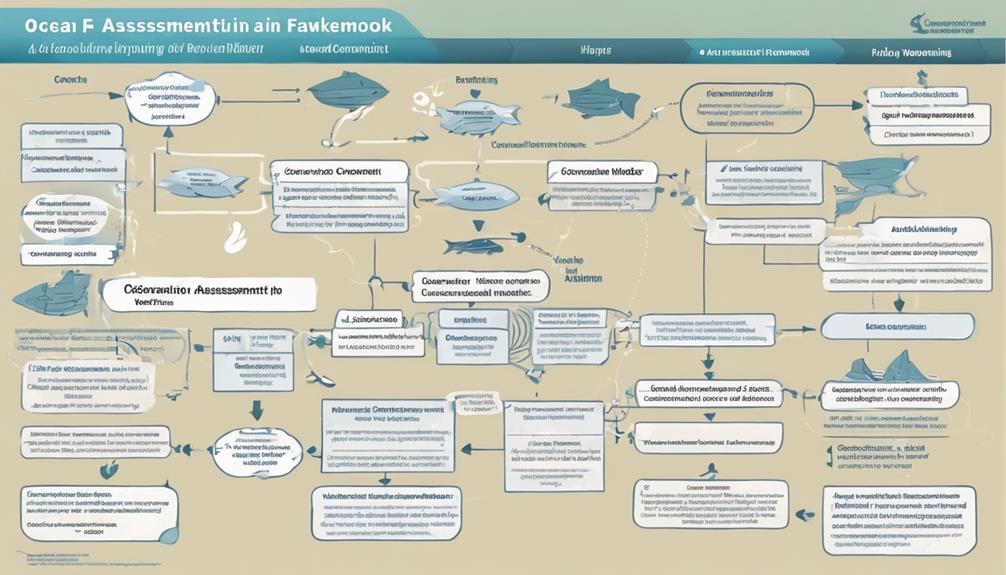
To enhance the preservation of marine ecosystems, a comprehensive approach integrating various conservation measures is essential. When implementing conservation measures, we must consider the interconnectedness of marine life and the delicate balance of the ocean environment. Here are key steps to effectively implement conservation measures:
- Establish Marine Protected Areas: Creating designated zones helps protect biodiversity and critical habitats from human activities such as overfishing and habitat destruction.
- Reduce Threats: Conservation measures focus on mitigating threats like overfishing and pollution that endanger marine species and disrupt the marine ecosystem's equilibrium.
- Promote Sustainable Practices: Encouraging sustainable fishing practices and reducing pollution ensures the long-term health and resilience of marine resources for future generations.
Making a Positive Impact on Oceans
Promoting sustainable practices in ocean conservation is key to making a positive impact on marine ecosystems. By implementing marine spatial planning, we can effectively manage human activities in oceans, reducing harmful impacts on marine life.
Following an ecosystem-based management approach is crucial for the conservation of marine ecosystems, ensuring a balanced and healthy ocean environment. Sustainable practices in utilizing marine resources are essential for the long-term health of our oceans, preventing overexploitation and depletion of vital species.
Integrating environmental concerns into planning processes is fundamental for sustainable ocean management, fostering a holistic approach that considers the interconnectedness of marine systems. Initiatives like Respectzone play a significant role in promoting respectful behavior towards the oceans, encouraging responsible actions that contribute to conservation efforts.
Frequently Asked Questions
What Is the Big 5 Framework Ocean?
We've got you covered!
The Big 5 framework, also known as OCEAN, delves into personality traits like Openness, Conscientiousness, Extroversion, Agreeableness, and Neuroticism. It offers valuable insights into behaviors, work preferences, and values of individuals.
Widely used in psychology and recruitment, the Big 5 model helps in making informed hiring decisions and fostering effective team dynamics. It's a powerful tool for understanding people and optimizing workplace interactions.
What Is the OCEAN 5 Factor Model?
Sure, the OCEAN 5 Factor Model categorizes personality traits into Openness, Conscientiousness, Extroversion, Agreeableness, and Neuroticism.
It's a tool for understanding behavior, values, and work preferences.
Widely used in psychology and recruitment, OCEAN aids in making informed hiring decisions and matching candidates to suitable roles.
Understanding this model enhances recruitment accuracy, contributing to building effective teams.
What Are the 5 Main Components of Personality Represented by the Ocean Model Discussed in Chapter 12?
We find the Ocean model in Chapter 12 detailing 5 key personality components:
- Openness, which measures receptiveness to new experiences and creativity.
- Conscientiousness, covering traits like organization and dependability.
- Extroversion, gauging energy levels around others.
- Agreeableness, assessing interpersonal harmony and pro-social behaviors.
- Neuroticism, which evaluates emotional stability.
These elements collectively provide a comprehensive view of an individual's personality traits.
What Are the Five Letters of Ocean Model?
The five letters of the OCEAN model are Openness, Conscientiousness, Extroversion, Agreeableness, and Neuroticism. These letters represent crucial personality traits that provide deep insights into individual behaviors and workplace dynamics.
Understanding each trait helps in comprehending how individuals interact, handle stress, and approach tasks. Employing the OCEAN model can greatly enhance team building efforts and improve strategies for managing employees effectively.
What Are the Key Steps in Using the Ocean Assessment Framework for Marine Research?
When conducting marine research, utilizing ocean assessment tools is crucial. The key steps in using the Ocean Assessment Framework for marine research involve collecting relevant data, analyzing the information, and interpreting the findings to gain insights into the health and quality of the marine environment.
Conclusion
In conclusion, the Ocean Assessment Framework offers a systematic approach to managing marine ecosystems, ensuring their sustainability and health. By utilizing key indicators and data analysis, we can implement conservation measures that make a positive impact on oceans.
How can we continue to protect and preserve our marine resources for future generations to enjoy?
Eugene brings a fresh, dynamic voice to our platform as one of our talented Writers. Specializing in research-driven content, he explores the latest findings in psychology and personal growth, translating them into actionable insights for our readers. Eugene’s work is fueled by a curiosity about what makes us tick and a desire to help others unlock their potential.
The Big Five (OCEAN)
Top 3 Ocean Assessment Tools for Marine Researchers
Wade into the depths of marine research with the top three ocean assessment tools that are revolutionizing how we explore and conserve our oceans.
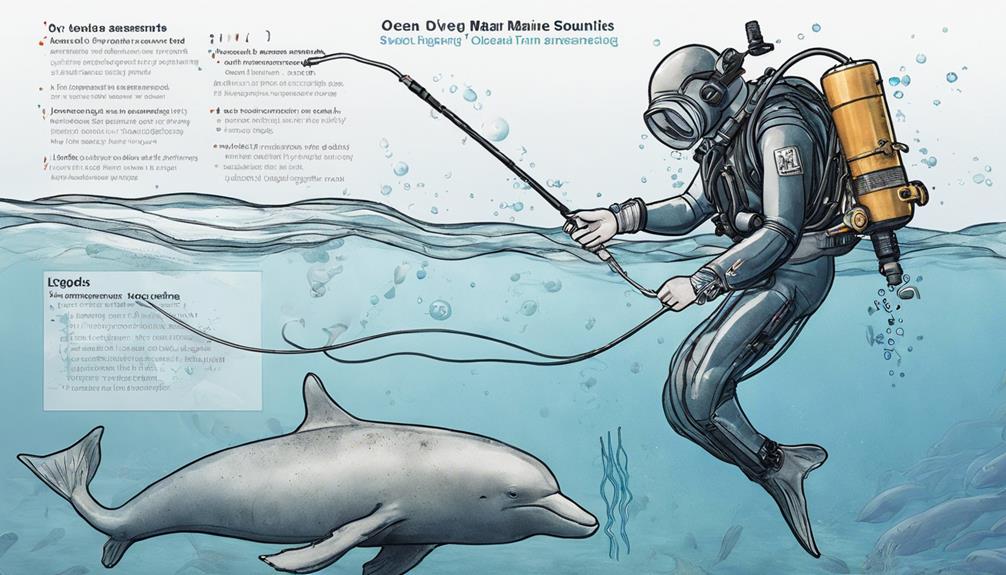
We have all faced the daunting challenge of choosing the best ocean assessment tools for our research projects. But have no fear, as we explore the wide array of options to identify the top three essential tools for marine researchers.
These tools are not only essential but also groundbreaking in their capabilities to unravel the mysteries of the ocean depths. So, which tools made the cut and why are they indispensable assets for those exploring the marine realm?
Stay tuned to discover the key players shaping the future of oceanic research and conservation.
Key Takeaways
- Underwater Drones (ROVs) aid in high-resolution ocean floor mapping and provide access to deep ocean environments.
- Acoustic technology efficiently covers large areas in surveys, helping in tracking fish populations and assessing biodiversity.
- Satellite imaging offers real-time data on ocean parameters, supporting global conservation efforts and monitoring climate change impacts.
- Data analysis tools provide insights into marine ecosystem health, aiding in sustainable management of ocean resources and guiding conservation efforts.
Underwater Drones for Ocean Mapping
Underwater drones, also known as Remotely Operated Vehicles (ROVs), play a crucial role in high-resolution ocean floor mapping for marine researchers. Equipped with cameras, sensors, and sampling devices, these drones allow us to explore the depths of the ocean where human divers can't reach.
The ability to operate at great depths provides us with access to a world teeming with diverse marine organisms and unique ecosystems. ROVs enable us to study the water column, collect samples, and analyze the distribution of species in their natural habitat.
Satellite Imaging for Ocean Monitoring

Satellite imaging plays a pivotal role in ocean monitoring by providing real-time data on essential parameters such as ocean surface temperature, chlorophyll concentration, and sea level height. These images help monitor ocean currents, detect phytoplankton blooms, and track changes in sea ice extent. The table below illustrates some of the key aspects of satellite imaging for ocean monitoring:
| Parameters | Information Provided | Application |
|---|---|---|
| Ocean Surface Temperature | Helps track variations in temperature, aiding in the prediction of weather events. | Monitoring climate change impacts. |
| Chlorophyll Concentration | Indicates levels of phytoplankton, crucial for understanding marine ecosystems. | Detecting phytoplankton blooms. |
| Sea Level Height | Assists in studying sea level rise and ocean circulation patterns. | Monitoring coastal erosion and storm surges. |
Satellite data aids in understanding ocean circulation patterns, identifying marine pollution, and predicting weather events. Researchers utilize satellite imaging to study coral reef health, monitor coastal erosion, and assess the impact of climate change on oceans. The continuous monitoring capabilities of satellite imaging support global efforts in ocean conservation and management.
Acoustic Technology for Marine Surveys
Utilizing acoustic technology, marine researchers employ sound waves to map the seafloor and detect marine organisms in comprehensive surveys. Acoustic surveys play a vital role in studying marine habitats, tracking fish populations, and assessing biodiversity in underwater environments.
Here are four key aspects of how acoustic technology enhances marine surveys:
- Efficient Coverage: Acoustic surveys can efficiently cover large areas, providing researchers with extensive data on marine ecosystems and their overall health.
- Species Identification: By analyzing acoustic data, scientists can identify species distributions, migratory patterns, and even detect underwater structures essential for marine life.
- Conservation Guidance: Acoustic technology is crucial for understanding marine environments, guiding conservation efforts, and promoting sustainable management of ocean resources.
- Ecosystem Health: Acoustic surveys help researchers monitor the health of marine ecosystems, offering valuable insights for preserving these vital habitats.
Frequently Asked Questions
What Are 3 Tools Oceanographers Use?
We use Conductivity-Temperature-Depth (CTD) profilers to measure properties like salinity, temperature, and depth.
Environmental sensors on collecting nets help us gather data on marine organisms.
Satellite data provides crucial real-time information for monitoring.
CTD rosettes collect water samples at various depths.
Remotely Operated Vehicles (ROVs) are essential for exploring ocean depths.
These tools help us study marine environments more effectively and understand ocean processes better.
What Are the 3 Technologies for Studying the Ocean Floor?
When studying the ocean floor, researchers rely on multibeam bathymetric systems for detailed seafloor mapping. Sonar and seismic profiling technologies provide geological insights, while acoustic systems are used for biomass estimation.
These tools collectively offer a comprehensive understanding of oceanic structures, processes, and marine life. By combining these technologies, marine researchers gain valuable data to further our knowledge of the underwater world.
What Are Some Tools Marine Scientists Use to Study the Ocean?
We utilize various tools to study the ocean, including CTD profilers for measuring physical data, multibeam bathymetric systems to map seafloor topography, and acoustic systems for estimating biomass.
Water sampling devices like the CTD/rosette system help gather data for chemical analysis.
Remotely Operated Vehicles (ROVs) allow us to explore ocean depths and conduct research in challenging environments.
These tools provide valuable insights into marine ecosystems and ocean properties.
Which Tool Would a Scientist Use to Study Ocean Currents?
We'd use Acoustic Doppler Current Profilers (ADCPs) to study ocean currents. These instruments measure water velocities at different depths non-intrusively using Doppler technology. ADCPs can be mounted on moorings, boats, or autonomous underwater vehicles for continuous monitoring.
The data they provide is crucial for understanding ocean circulation dynamics and their impact on climate systems. By creating models and forecasts based on ADCP data, we can advance various marine research studies effectively.
How are the Ocean Assessment Tools for Marine Researchers Different from the Global Marine Assessment?
Ocean assessment tools for marine researchers focus on local and specific data collection, analysis, and monitoring of marine environments. In contrast, the global marine assessment provides insights into the overall health and condition of the world ocean, considering a broader perspective on the state of marine ecosystems and resources.
Conclusion
In conclusion, the top 3 ocean assessment tools for marine researchers provide invaluable insights into the health and dynamics of our oceans.
Underwater drones, satellite imaging, and acoustic technology offer precise data for mapping, monitoring, and surveying marine environments.
Their combined capabilities create a comprehensive understanding of ocean ecosystems, aiding in conservation efforts.
The use of these advanced tools enhances our ability to protect and preserve our precious marine resources.
Eugene brings a fresh, dynamic voice to our platform as one of our talented Writers. Specializing in research-driven content, he explores the latest findings in psychology and personal growth, translating them into actionable insights for our readers. Eugene’s work is fueled by a curiosity about what makes us tick and a desire to help others unlock their potential.
-

 Self-Understanding3 months ago
Self-Understanding3 months agoUnderstanding DMCA Protections & Compliance
-

 Relationship Dynamics3 months ago
Relationship Dynamics3 months agoCan a Man Truly Love His Side Chick
-

 Enneagram of Personality1 week ago
Enneagram of Personality1 week agoEnneagram Test: Printable Version for Easy Self-Discovery
-

 Personality Exploration3 weeks ago
Personality Exploration3 weeks agoDiscover Your Traits with Atomic Habits Personality Test
-

 Personality Exploration3 months ago
Personality Exploration3 months agoDOPE Personality Test Explained: Traits & Types
-

 Personality Exploration3 months ago
Personality Exploration3 months agoAlpha Beta Omega Sigma Female Personality Quiz
-

 Personality Exploration2 weeks ago
Personality Exploration2 weeks agoAlpha Beta Omega Personality Test Explained
-

 Self-Understanding2 months ago
Self-Understanding2 months agoDiscover Your Traits with Our Personality Test
